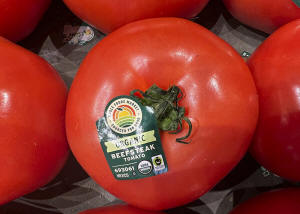Amid Cinco de Mayo celebrations, a tax on Mexican tomatoes looms
[May 05, 2025] By
DEE-ANN DURBIN
Guacamole has been spared from tariffs for now. But salsa may not be so
lucky.
While President Donald Trump put threatened tariffs on Mexican avocados
on pause, the U.S. government plans to put a nearly 21% duty on fresh
Mexican tomatoes starting July 14. A duty — like a tariff — is a tax on
imports, and this one would impact the 4 billion pounds of tomatoes the
U.S. imports from Mexico each year.
Proponents say the import tax will help rebuild the shrinking U.S.
tomato industry and ensure the produce eaten in the U.S. is also grown
there. Mexico currently supplies around 70% of U.S. tomato market, up
from 30% two decades ago, according to the Florida Tomato Exchange.
“Unless we even the playing field in terms of fair pricing, you’re not
going to have a domestic industry for fresh tomatoes in the very near
future,” Robert Guenther, the trade group's executive vice president,
said. Florida and California are the top U.S. producers of tomatoes, but
most of California’s crop is turned into sauces and other products.
Opponents say the duty will make fresh tomatoes more expensive for U.S.
buyers. NatureSweet, a San Antonio-based company that grows tomatoes in
Mexico as well as the U.S., said it will be paying millions of dollars
each month in duties if the decision isn’t reversed.
“We will look for ways to adapt or streamline our operations, but the
truth is, we are always doing that so we run an efficient business
already,” said Skip Hulett, NatureSweet’s chief legal officer. “Produce
is not a large-margin business. We’re determining what portion of the
cost we could absorb, but these added costs will most certainly need to
be passed on to the consumer.”
Tim Richards, a professor at the Morrison School of Agribusiness at
Arizona State University, expects U.S. retail prices for tomatoes to
rise by around 10.5% if the duty goes through.
Mexico’s government said last month it was convinced it could negotiate
over the issue. But if the tomato tax takes effect, Mexican President
Claudia Sheinbaum has hinted her country may impose duties on chicken
and pork legs imported from the U.S.

The tug-of-war over tomatoes has a long history. In 1996, shortly after
the North American Free Trade Agreement went into effect, the U.S.
Department of Commerce investigated allegations that Mexico was
exporting tomatoes to the U.S. at artificially low prices, a practice
known as dumping.
The U.S. government agreed to suspend the investigation if Mexico met
certain rules, including selling its tomatoes at a minimum price. Since
then, the agreement has been subject to periodic reviews, but the two
sides always reached an agreement that avoided duties.
But last month, the Commerce Department announced its withdrawal from
the latest agreement, saying it had been “flooded with comments” from
U.S. tomato growers who want better protection from Mexican imports.
Guenther, of the Florida Tomato Exchange, said even though Mexican
exporters are required to charge a minimum price, shipments are only
spot-checked, so exporters can get around that. But more generally,
Mexico hurts the U.S. industry because it costs 40% to 50% less to grow
tomatoes there, Guenther said. Land is cheaper, labor is cheaper and
inputs like seeds and fertilizer cost less, he said.

[to top of second column] |

Tomatoes imported from Mexico are for sale in a supermarket in Miami
as the United States imposed 25% tariffs on goods from Canada and
Mexico, starting a trade war with its closest neighbors and allies
Wednesday, March 5, 2025. (AP Photo/Lynne Sladky, File)
 Tomatoes are a labor-intensive crop,
Guenther said, and the U.S. industry typically relies on immigrant
workers through the H-2A visa program. That program required farmers
to pay workers an average of $16.98 per hour last year, an amount
that has jumped as labor has become harder to find. Richards
estimates that workers on Mexican tomato farms earn about one-tenth
that rate.
NatureSweet acknowledges that it’s more cost-effective to grow
tomatoes in Mexico, but says climate is one of the biggest reasons.
The company’s Mexican greenhouses don’t need lighting, heating or
cooling systems because of the year-round weather conditions.
“You can relocate some industries, but you can’t relocate climate
agriculture,” Hulett said.
Lance Jungmeyer, the president of the Fresh Produce Association of
the Americas, which represents importers of Mexican tomatoes, said
Florida doesn’t produce the vine-ripened tomatoes that U.S.
consumers increasingly favor. Florida tomatoes are picked when
they’re green and shipped to warehouses to ripen, he said.
“Florida doesn’t grow the kinds of specialty tomatoes that have
taken off, but they want to get protection,” Jungmeyer said. “Their
market share is dropping for reasons of their own choice.”
Guenther disagrees. “If you put a Florida tomato up against a
Mexican tomato, I think it would do very well in taste test,” he
said.
Adrian Burciaga, co-owner of Don Artemio, an upscale Mexican
restaurant in Fort Worth, Texas, wouldn’t want to switch to a U.S.
producer. He compares it to fine wine; if he wants a good cabernet
sauvignon, he gets it from Napa, California. If he wants a good
tomato that reminds him of his childhood, he gets it from Mexico.
“We know the flavors they are going to bring to the salsas and
moles. We don’t want to compromise flavors,” Burciaga said.
Burciaga said his restaurant uses 300 to 400 pounds of Roma tomatoes
from Mexico every week. He currently pays $19 for a 25-pound crate
of tomatoes. He doesn’t relish paying the additional cost, but he
feels he has no choice.
Burciaga said the tomato duty — and the threat of Trump implementing
the paused 25% tariff on many other products from Mexico — are
making it difficult to run his business.
“The uncertainty part concerns us. A small or medium restaurant
budgets things out. We know in advance that in six months things
will increase, so we’re able to adjust,” he said. “But we don’t know
these things in advance. How do you plan and how do you react?”
___
AP Reporter Maria Verza in Mexico City contributed.
All contents © copyright 2025 Associated Press. All rights reserved |